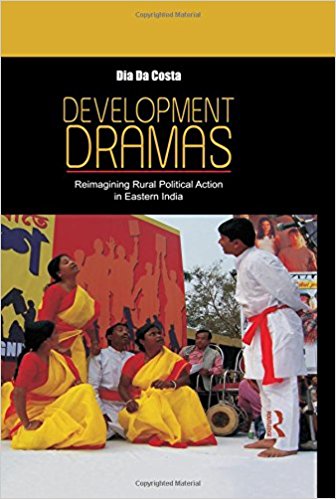This fascinating ethnographic analysis of political action through the lens of political theatre breathes and brings new meaning into our conceptualizations of ‘development’. Situated in two districts of West Bengal in Eastern India, the study critically looks at the ways in which one organization, the Jana Sanskriti (JS) (People’s Culture) operative since 1985, provides grounded constructions and trenchant critiques of development discernible in everyday rural political action on and off-stage in West Bengal. In the process, the author notes, that the JS has contributed to revealing ‘the formation of CPM’s hegemonic political society and the ongoing normalization of the market episteme that underlies prevailing notions of development in West Bengal…
Their on-stage political theatre and off-stage political action feed each other to reveal the processes through which electoral success and agrarian reforms benefiting the dispossessed have ironically enabled structural and subjective closure on alternate meanings of rural futures, collectivity, and social transformation’ (p. 5). The theme of theatre inevitably leads to a discussion of culture. In her Introduction, Dia Da Costa frontally confronts the theme of ‘Culture’ and its relationship to development, and in the process provides a critical reading, among others, of Amartya Sen’s understanding of the place of culture in development. What makes this engagement with Sen interesting is the fact that the critique is grounded in the Tata-Singur-people’s car episode and Sen’s position on this matter, wherein, the author notes, Sen contradicts his own philosophical discussion on progress as freedom: ‘While Sen is celebrated for attending to culture and human development, his view maintains the ideological boundary between the global macro-space of capital and the local micro-space of culture while neglecting to highlight capitalism as cultural formation’ (p. 18).

